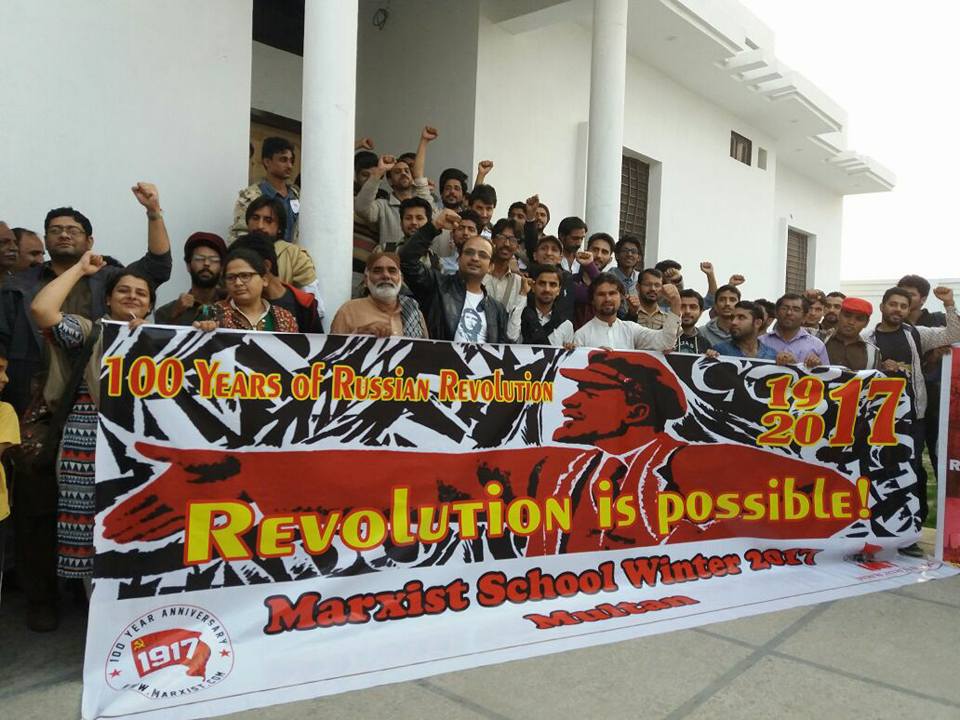On 18 and 19 February a Marxist School was held in Multan. This school was dedicated to the 100th anniversary of Russian Revolution. Young comrades from all over the country started arriving in Multan on the evening of 16 February. From Kashmir to Karachi comrades had to travel long distances amid difficult economic conditions, but they arrived with revolutionary enthusiasm. On 17 February a convention of Multan city was organized by the Progressive Youth Alliance in which all comrades participated with Bolshevik spirit. Afterwards they stayed to attend this two day national school. More than 70 comrades participated in the school. The hosts of this school made it a success despite the financial difficulties. The school comprised four sessions - two sessions were held each day.
The first session was on World Perspectives which was chaired by comrade Faras from Karachi while comrade Asif Lashari from D.G.Khan gave the lead off. Lashari explained the crisis of capitalism, which is reflected in events throughout the world. He said that capitalism still has not found any way out of the current impasse and one event after the other adds to this crisis. This crisis is one of the most extraordinary crises in the history of capitalism and with the vast spread of global trade in the last period has had a much more severe impact on the whole world. Today the whole world economy is more integrated than ever and the shocks in the economy at one end are felt all the way at the opposite end of the world. This has also had an impact on the relations between different imperialist powers of the world and is changing the global balance of forces. China and Russia are challenging US imperialism in many regions. In the Middle East the imperialist alliance of Russia and Iran has dealt the Americans a serious blow, while China is gaining influence in South Asia. With the "One Belt One Road" project, on which more than $1 trillion will be spent China is building roads to connect 64 countries. The China-Pakistan Economic Corridor (CPEC) is also part of this project.
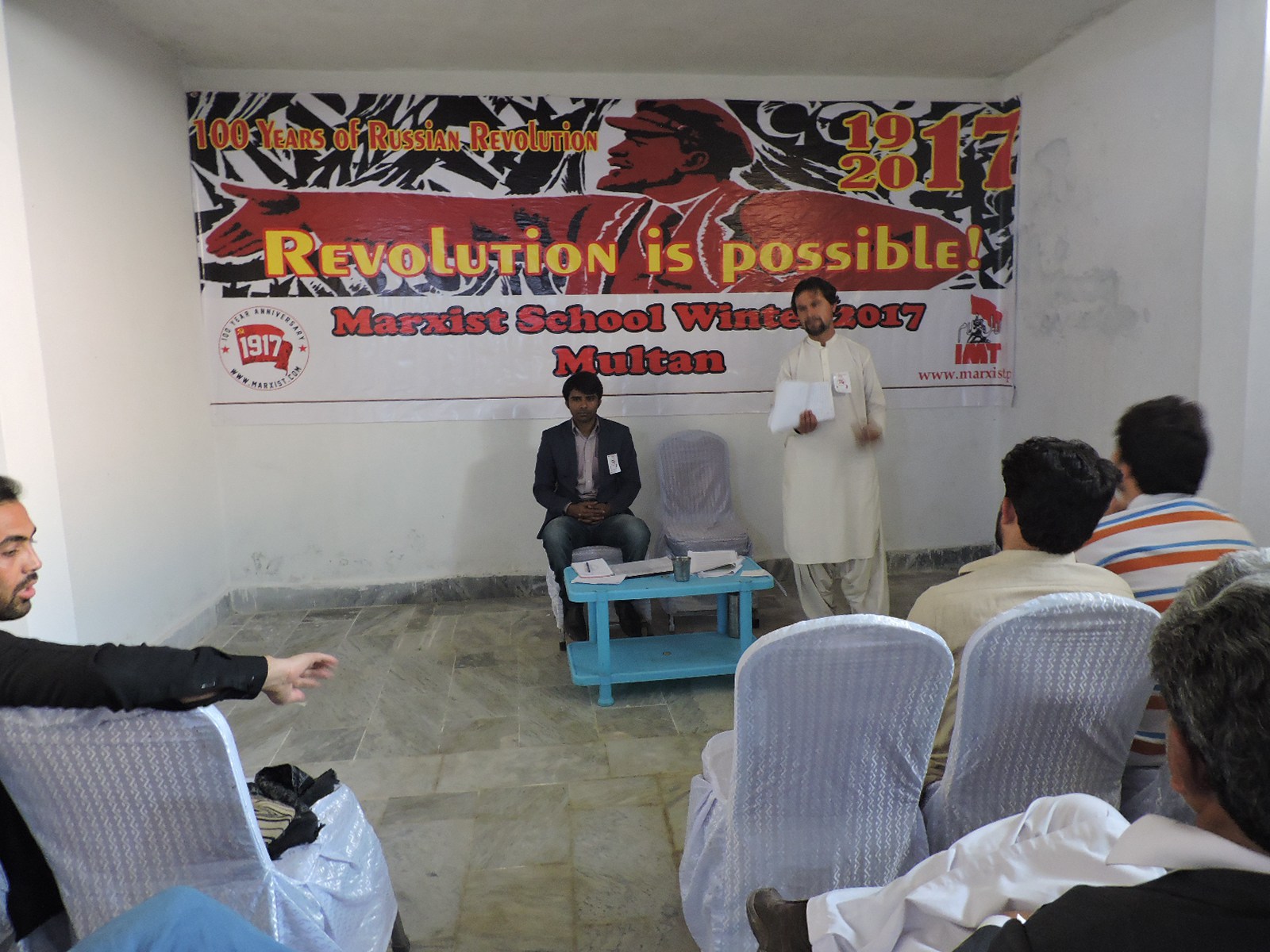 This is having a huge impact on politics. Events which seemed to be impossible a few years ago are becoming routine in world politics. Who could have thought that a person like Donald Trump would become president of the USA or that Bernie Sanders would get a huge response for his ‘socialist’ slogans. Who could have predicted that Britain would leave the European Union or that a right-wing fundamentalist like Modi would become the Indian prime minister. Today there is a resurgence of polarization to the left and to the right in politics - the speed of political developments is much faster than in the past period. The working class is attracted to radical slogans in a struggle to improve its living conditions.
This is having a huge impact on politics. Events which seemed to be impossible a few years ago are becoming routine in world politics. Who could have thought that a person like Donald Trump would become president of the USA or that Bernie Sanders would get a huge response for his ‘socialist’ slogans. Who could have predicted that Britain would leave the European Union or that a right-wing fundamentalist like Modi would become the Indian prime minister. Today there is a resurgence of polarization to the left and to the right in politics - the speed of political developments is much faster than in the past period. The working class is attracted to radical slogans in a struggle to improve its living conditions.
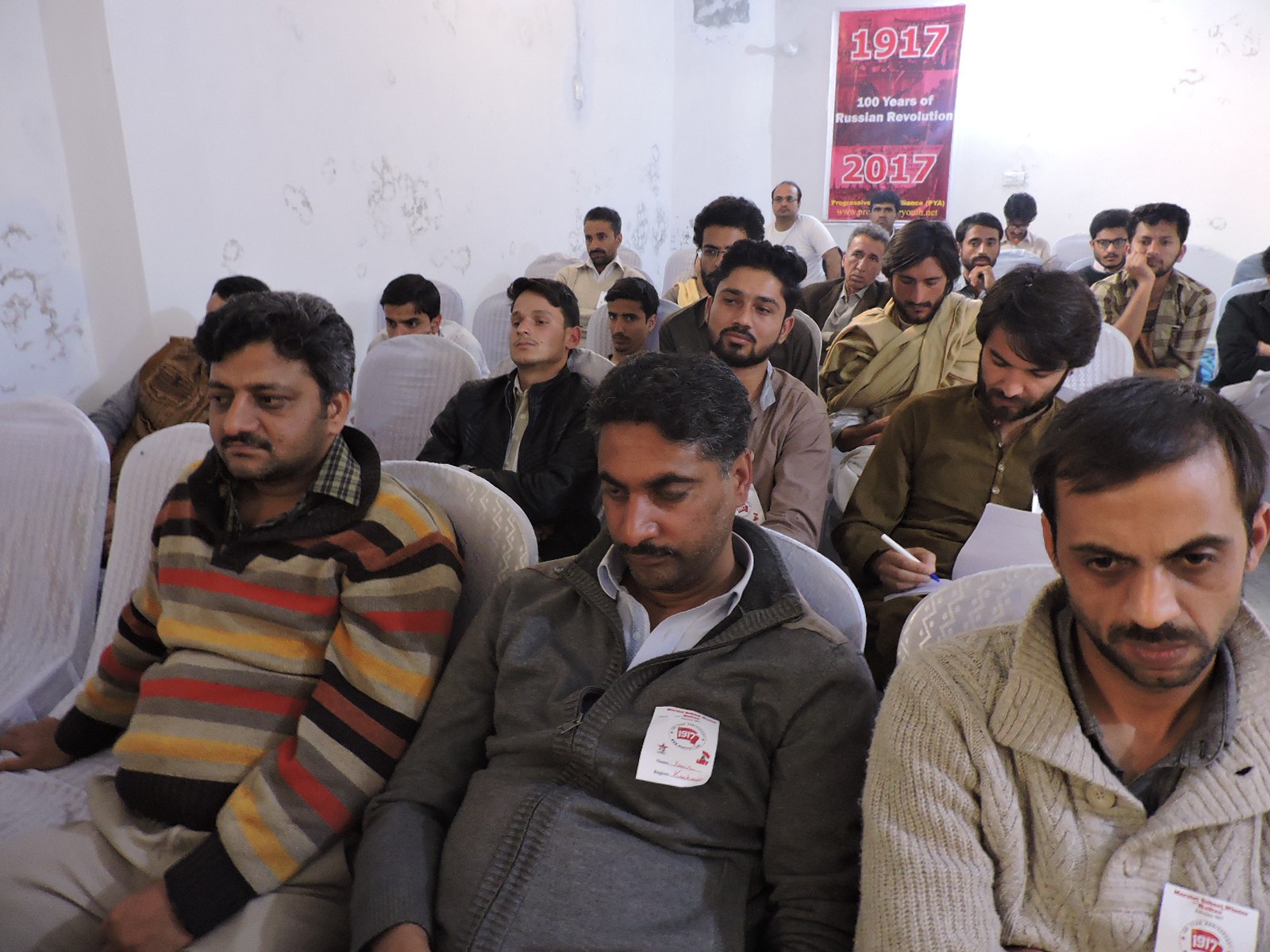 Polarization is increasing across the whole world. Traditional parties which can't play role in these events are entering into crisis while new parties are emerging. In this epoch it is not only left-wing politics that will emerge, but contradictory currents, to the Left and to the Right will emerge.
Polarization is increasing across the whole world. Traditional parties which can't play role in these events are entering into crisis while new parties are emerging. In this epoch it is not only left-wing politics that will emerge, but contradictory currents, to the Left and to the Right will emerge.
This process can be observed in Pakistan where new layers of society are becoming politically active. This can be seen in scattered movements across the country over various issues. Workers are coming out against privatizations, but due to the betrayals of the traditional trade union leadership these movements are not succeeding. There is a big vacuum in the politics of Pakistan both on the Left and on the Right. Sooner or later the rising class struggle will have to find a political expression which might not necessarily be within the current established political set up.
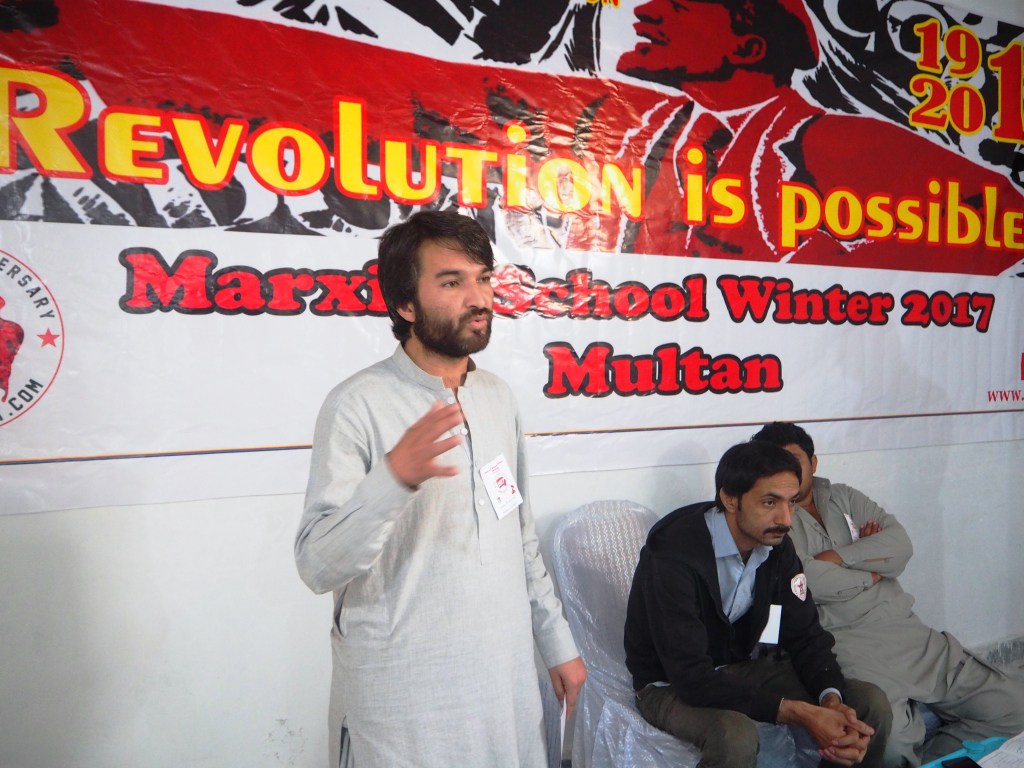 The China-Pakistan Economic Corridor (CPEC) has made Pakistan a battlefield for various imperialist powers. Their conflicts, which are also reflected on the political horizon, are deepening. On 2 February last year a strike by workers of PIA posed new questions for the working class throughout the whole country, including the question of a general strike. It’s important that all these scattered movements come together to strike fundamental blows against the ruling class. Those pessimists who have stopped believing in the strength of working class of this country will soon get a shock. We will see that our working class will write new chapters in the history of our struggle.
The China-Pakistan Economic Corridor (CPEC) has made Pakistan a battlefield for various imperialist powers. Their conflicts, which are also reflected on the political horizon, are deepening. On 2 February last year a strike by workers of PIA posed new questions for the working class throughout the whole country, including the question of a general strike. It’s important that all these scattered movements come together to strike fundamental blows against the ruling class. Those pessimists who have stopped believing in the strength of working class of this country will soon get a shock. We will see that our working class will write new chapters in the history of our struggle.
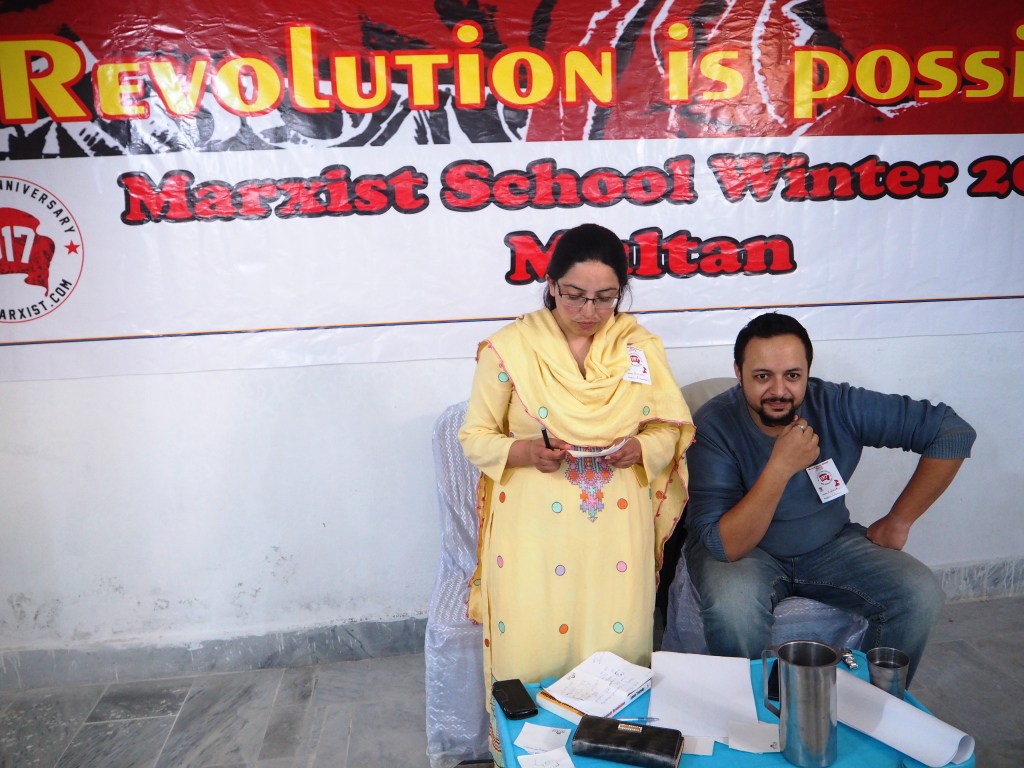 In these conditions we cannot move forward with old formulas and tactics for building the revolutionary forces. We have to build our strategy and tactics on the basis of the concrete situation facing us. With genuinely revolutionary methods and courage we can overthrow this rotten capitalist system.
In these conditions we cannot move forward with old formulas and tactics for building the revolutionary forces. We have to build our strategy and tactics on the basis of the concrete situation facing us. With genuinely revolutionary methods and courage we can overthrow this rotten capitalist system.
After this introduction many comrades asked questions about the topic. Those who contributed in the session include Changez from Balochistan, Mujee Pasha from Faisalabad, Karim Parhar from Balochistan, Paras Jan from Karachi, Razaq Ghurzang from Balochistan and Aftab Ashraf from Lahore.
After the contributions Asif Lashari summed up the session. He said that the situation is demanding that we accelerate our efforts to build the revolutionary party. We have no time to lose. Such interesting times do not come very often. Today a new society can be built and humanity can get rid of this capitalist barbarism forever. History has put this responsibility on our shoulders - that we build a revolutionary party with the ideas of revolutionary Marxism, just like Bolsheviks did 100 years ago. We defend the legacy of the Bolshevik party and it is our responsibility to fulfill this historic task.
The second session was on the topic of the Theory of Permanent Revolution. Comrade Amna from Kashmir chaired the session while comrade Valeed Khan gave the lead-off.
Speaking on Trotsky's theory of permanent revolution, the comrade said that human civilization has travelled a long journey from primitive communism to capitalism, but this was never in a straight line. In different parts of the world the speed and character of development was always different. Thanks to revolutions in certain regions, development was achieved at a much faster speed compared to other societies. This development took the form of changing the social relations and modes of production of these societies. Under capitalism society is divided into two classes - the bourgeoisie and the proletariat. But in some regions capitalist development was distorted. In these places, along with the proletariat, the peasantry was playing an important role in society.
In Russia in 1904 capitalist relations were dominant but the social role of the feudal remnants posed the question of the peasantry in a revolution. In Russia, capitalism arrived not through a classical bourgeois revolution but mainly through investment by foreign capitalists. The result was a numerically weak proletariat - the population of peasants was a lot greater than the proletariat. This led to a debate between various Left currents as to which class would lead the revolution.
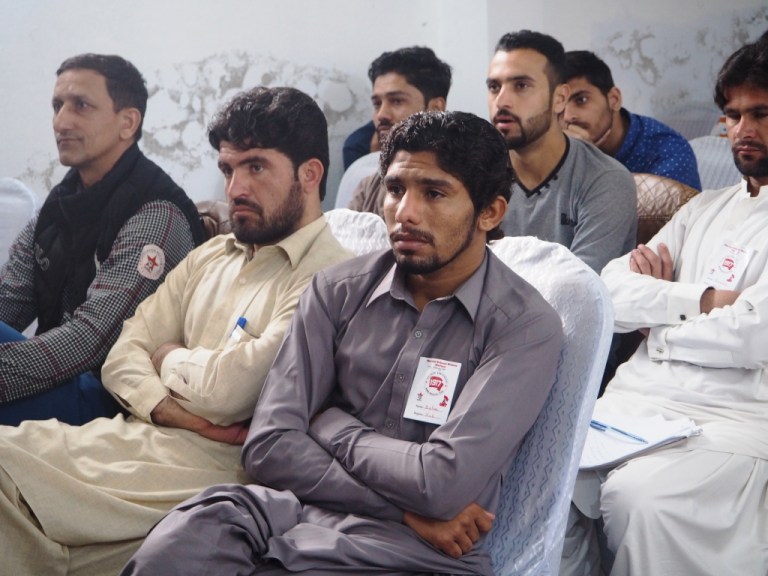 The Mensheviks, the Bolsheviks, and Trotsky all had different opinions on this question. The Mensheviks argued that because Russia is predominantly an agrarian society with feudalism dominating the mode of production, the revolution in Russia will be bourgeois democratic and that the bourgeoisie would lead this revolution. Until February 1917 the Bolsheviks were claiming that the Russian bourgeoisie could not lead the revolution due to its impotence in the face of imperialist capital. They said the Russian capitalists would play a reactionary role during the coming revolution. This is why, they said, the workers and peasants would lead the revolution together, and that this revolution would be bourgeois democratic in character. This, they said, would inspire socialist revolutions across Europe, which would in turn, light the spark in Russia for socialist revolution. Trotsky however argued that the Russian revolution would start from democratic demands but would not stop there - it would move forward to implement socialist measures. This revolution would go beyond the boundaries of Russia and mark the beginning of a world socialist revolution. Thus there are two aspects of the process which make it permanent: one is that it would start from democratic demands and move onto socialist ones, while the other is that it would start in one country and would go on spread across the whole world. In 1917 it was this perspective of Trotsky's that was proved correct. Lenin came to agree with it and argued the same points in his famous April Theses upon returning from exile in 1917. But, for various reasons, this successful revolution couldn't spread to other countries in Europe and remained isolated. This led to the rise of a bureaucratic clique inside Russia which strangled the revolution and eventually was the reason for the collapse of the Soviet Union eighty years later.
The Mensheviks, the Bolsheviks, and Trotsky all had different opinions on this question. The Mensheviks argued that because Russia is predominantly an agrarian society with feudalism dominating the mode of production, the revolution in Russia will be bourgeois democratic and that the bourgeoisie would lead this revolution. Until February 1917 the Bolsheviks were claiming that the Russian bourgeoisie could not lead the revolution due to its impotence in the face of imperialist capital. They said the Russian capitalists would play a reactionary role during the coming revolution. This is why, they said, the workers and peasants would lead the revolution together, and that this revolution would be bourgeois democratic in character. This, they said, would inspire socialist revolutions across Europe, which would in turn, light the spark in Russia for socialist revolution. Trotsky however argued that the Russian revolution would start from democratic demands but would not stop there - it would move forward to implement socialist measures. This revolution would go beyond the boundaries of Russia and mark the beginning of a world socialist revolution. Thus there are two aspects of the process which make it permanent: one is that it would start from democratic demands and move onto socialist ones, while the other is that it would start in one country and would go on spread across the whole world. In 1917 it was this perspective of Trotsky's that was proved correct. Lenin came to agree with it and argued the same points in his famous April Theses upon returning from exile in 1917. But, for various reasons, this successful revolution couldn't spread to other countries in Europe and remained isolated. This led to the rise of a bureaucratic clique inside Russia which strangled the revolution and eventually was the reason for the collapse of the Soviet Union eighty years later.
In his lead-off the comrade said that Stalinist bureaucracy advocated the incorrect theory of ‘socialism in one country’ which is totally against Marxism and is in fact based on Menshevik theory. This false theory is the reason why many revolutions of twentieth century didn't succeed in Asia and Africa and in fact ended in counter-revolutionary forces coming to power. The collapse of the Soviet Union is proof that the revolution cannot survive within nationalist boundaries and that it must spread to other countries if we are to achieve the final overthrow of world capitalism.
After the lead-off contributions were made by Karim Jamai from Dadu, Umer Riaz from Islamabad, Ubaid Zubair and Yasir Irshad from Kashmir, Adeel Zaidi and Aftab ashraf from Lahore, Zareef Rind from Karachi and Razzaq Ghurzang from Balochistan. In their contributions the speakers said that many countries in the world are proof of combined and uneven economic development, including Pakistan. Here a modern industrial society cannot be developed by capitalism and Trotsky's theory of permanent revolution is immensely important to understand this. Whether it is imperialist aggression or nationalist oppression, only a socialist revolution can end all these injustices. Even 100 years after the Russian Revolution this theory is still relevant. Movements erupting across the whole world can only achieve victory if they move forward, beyond democratic demands, towards socialist revolution. We need to wage a war against capitalism on the basis of the ideas of Marxist internationalism. Valeed Khan summed up the session.
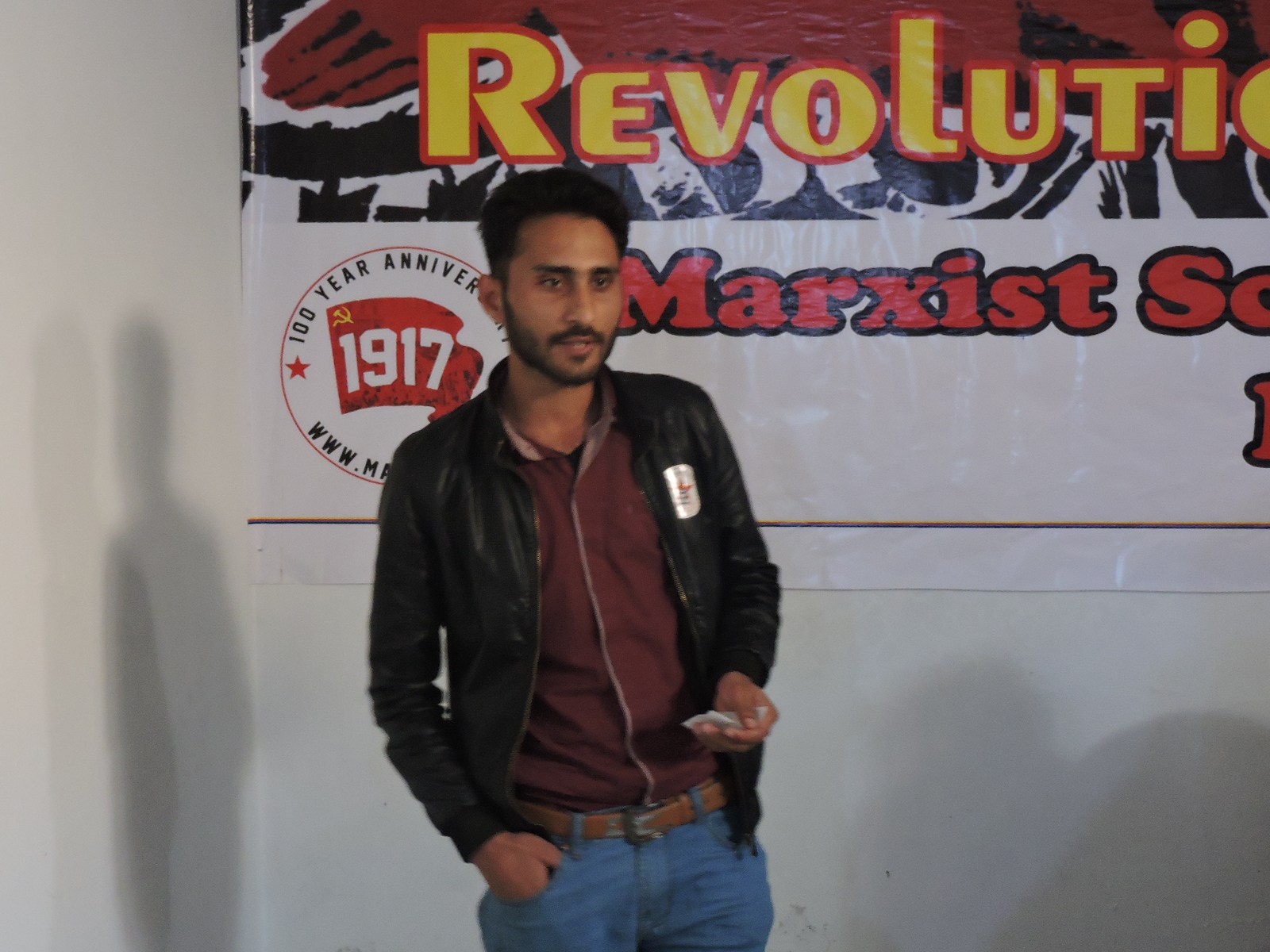 At the end of the sessions on the first day a youth commission was held to discuss the strategy for building the forces of revolutionary Marxism amongst the youth. Comrades from various cities participated and discussed plans to hold youth conventions and other activities in different cities. It was decided that all these activities will be dedicated to the 100th anniversary of the Russian Revolution.
At the end of the sessions on the first day a youth commission was held to discuss the strategy for building the forces of revolutionary Marxism amongst the youth. Comrades from various cities participated and discussed plans to hold youth conventions and other activities in different cities. It was decided that all these activities will be dedicated to the 100th anniversary of the Russian Revolution.
On the second day the first session was on Marxist philosophy and modern science. Umar Riaz from Islamabad chaired the session while Zain ul Abideen from Lahore gave the lead-off.
In his lead-off the comrade said that the developments in science it can sometimes seem like we don't need philosophy – all we need is science alone to understand the mysteries of universe. In this way the role of philosophy seems to have ended. But in reality, a philosophy is working beneath all scientific discoveries and inventions, whether it is explicitly recognized or not. But in many cases this philosophy is outdated or insufficient - its replacement with Marxist philosophy, with dialectical materialism, is a necessity for future developments. Science cannot resolve many of the paradoxes it has uncovered and is stumbling into one obstacle after another. This is leading to a re-emergence of religious and spiritual tendencies amongst some scientists to explain various phenomena. Only by understanding scientific processes on the basis of dialectical materialism can science answer its most profound questions. Even the history of the development of science is a dialectical process. Many laws and theories which were considered absolute at one stage were challenged with new research and their exact opposite subsequently became truth. The advances which science has achieved today and the complex processes it is discovering, such as quantum mechanics require Marxist philosophy to help understand them.
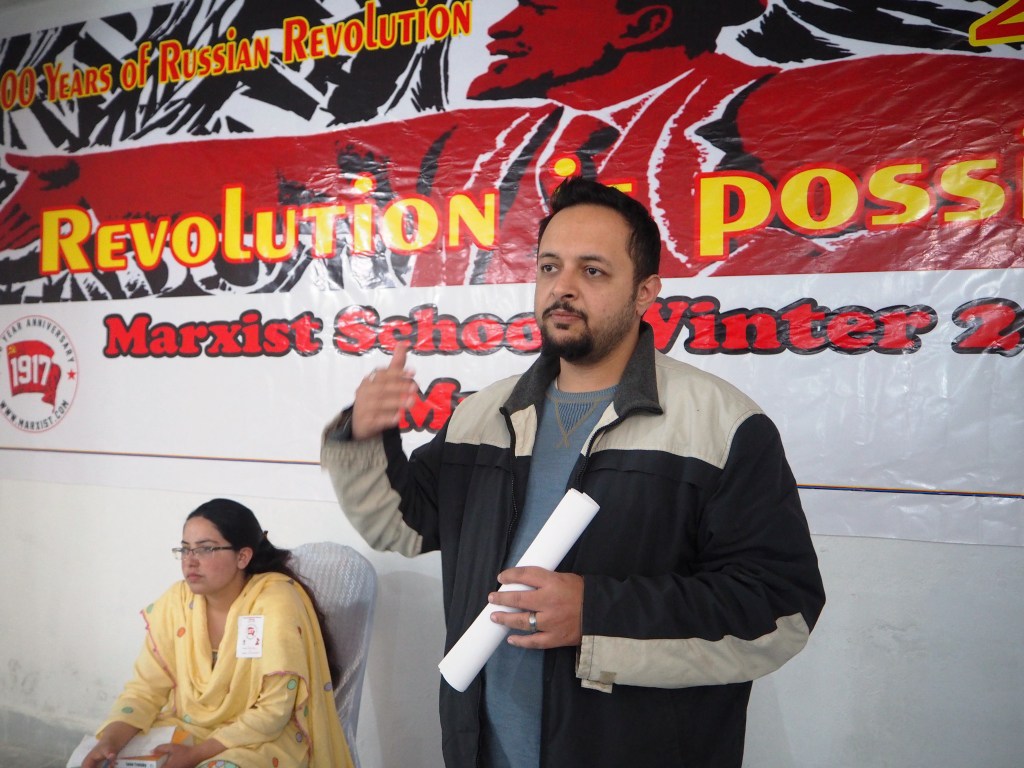 Some people say that scientists base their research on facts, but facts do not choose themselves. Without a conscious philosophical outlook scientists can make many serious mistakes. Today science is in crisis and is opening up debates that were thought to have been settled many centuries ago. Science itself needs a revolution – it needs to base itself on dialectical materialism and thereby achieve new heights.
Some people say that scientists base their research on facts, but facts do not choose themselves. Without a conscious philosophical outlook scientists can make many serious mistakes. Today science is in crisis and is opening up debates that were thought to have been settled many centuries ago. Science itself needs a revolution – it needs to base itself on dialectical materialism and thereby achieve new heights.
After that questions and contributions started. Ali Shahbaz and Mujee Pasha from Faislabad, Aftab Ashraf and Adeel Zaidi from Lahore, Paras Jan from Karachi and Yasir Irshad from Kashmir took part in the debate and highlighted various aspects of the subject. Zain summed up the session at the end.
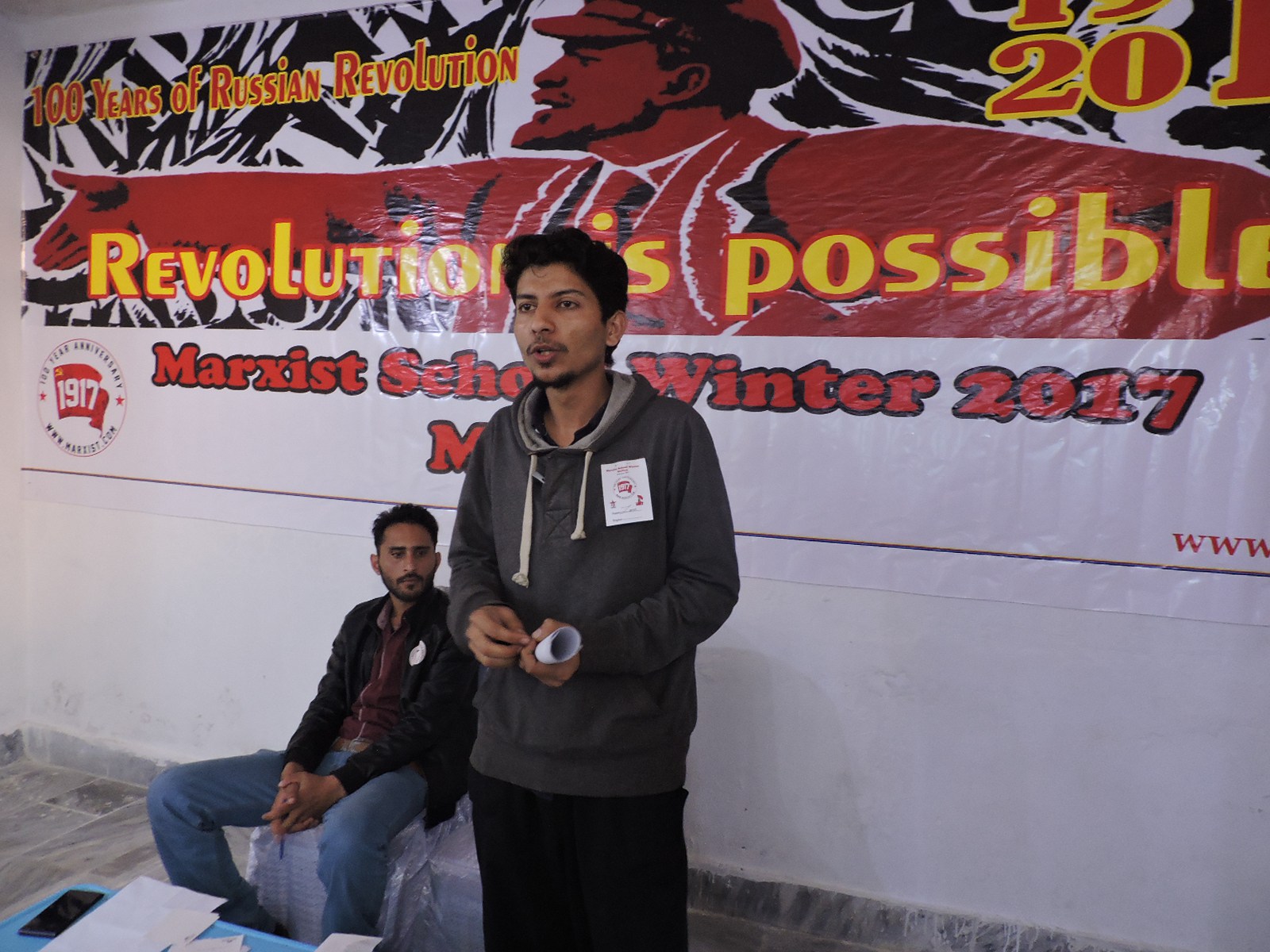 The last session of the school was on the topic of imperialism. Mujee Pasha from Faisalabad chaired the session while Razzaq Ghurzang gave the lead off. He based his discussion on Lenin's important work "Imperialism: The Highest stage of Capitalism" and explained the theory set forward in it. He said that surplus production under capitalism inevitably leads to the need for new markets for this surplus. Capitalism was a progressive step for mankind in its beginning, but today it has become a fetter on the further development of the productive forces. The capitalists of the world have waged two world wars and many other smaller wars and civil wars killing millions of human beings, all in the name of re-dividing markets amongst themselves. The nation state which emerged with capitalism has become obsolete and need to be replaced. The comrade also explained the role of multinational companies and how they are looting and plundering the whole world while building monopolies bigger than the economies of many poor countries.
The last session of the school was on the topic of imperialism. Mujee Pasha from Faisalabad chaired the session while Razzaq Ghurzang gave the lead off. He based his discussion on Lenin's important work "Imperialism: The Highest stage of Capitalism" and explained the theory set forward in it. He said that surplus production under capitalism inevitably leads to the need for new markets for this surplus. Capitalism was a progressive step for mankind in its beginning, but today it has become a fetter on the further development of the productive forces. The capitalists of the world have waged two world wars and many other smaller wars and civil wars killing millions of human beings, all in the name of re-dividing markets amongst themselves. The nation state which emerged with capitalism has become obsolete and need to be replaced. The comrade also explained the role of multinational companies and how they are looting and plundering the whole world while building monopolies bigger than the economies of many poor countries.
He said that imperialist powers are exporting capital and that this has a different character compared to previous centuries. As opposed to direct control over colonies, as was the case in the eighteenth and nineteenth centuries, today they are using imperialist financial institutions to dominate countries throughout the world. This imperialist domination causes economic crisis in one country to spread to other parts of the world – this is the basis of the global crisis of capitalism.
After the lead-off comrades from different cities took part in the discussion. Faras from Karachi, Umar Riaz from Islamabad, Zareef Rind from Karachi and Rashid Khalid from Lahore participated and enriched the debate. They highlighted the role of Chinese imperialism in the region and the politics around CPEC. Ghurzang summed up the discussion in light of the questions and contributions. He concluded by saying that only through a socialist revolution we can overthrow imperialism and capitalism.
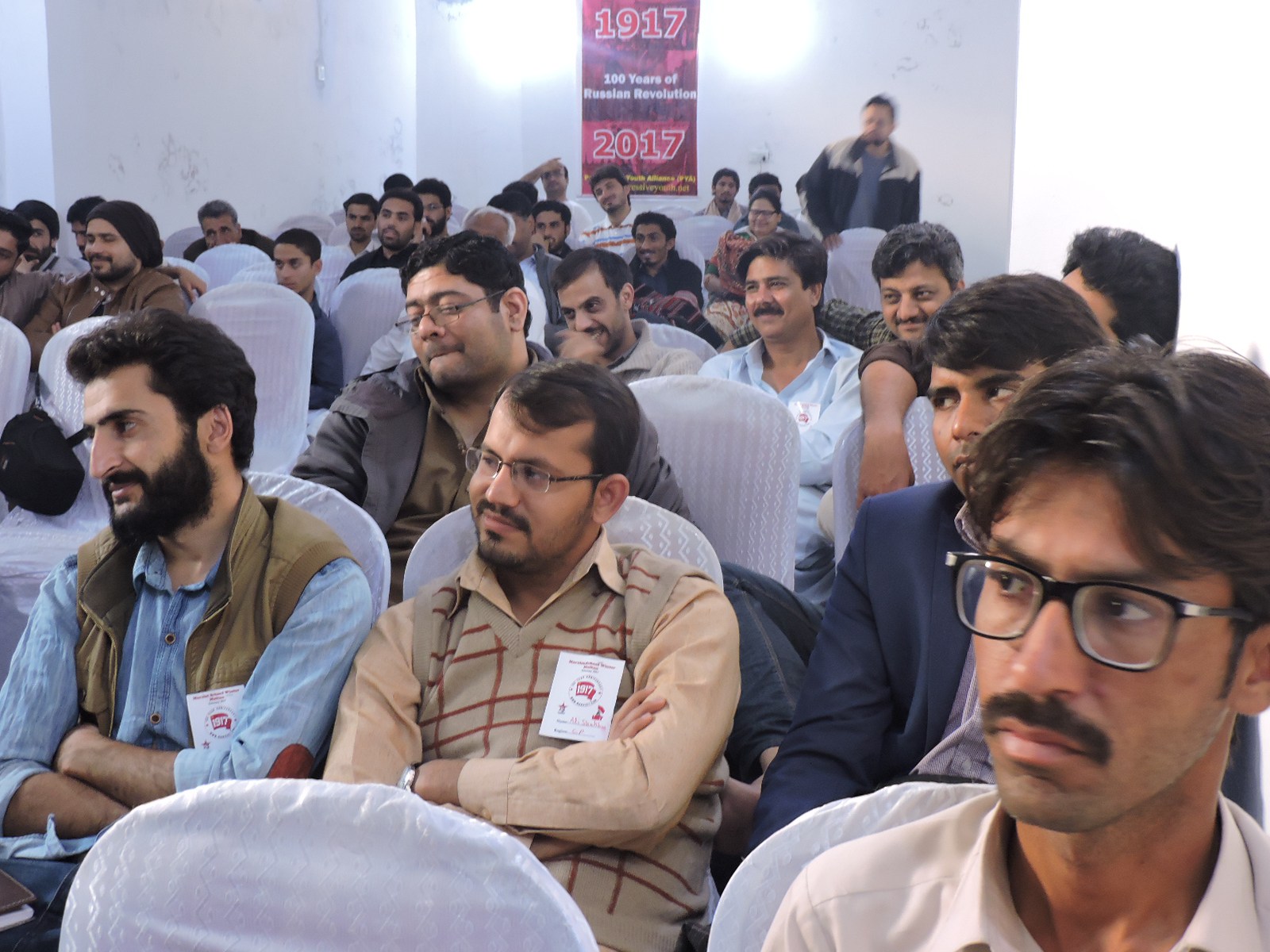 Comrade Paras Jan gave the closing remarks of the school and pointed out that we successfully organized this school despite financial difficulties. The high political level of the discussions was thanks to the preparations comrades made for these sessions, including the organization of schools in their cities on these topics before coming here. We should now translate these discussions into growth for our organisation and carry these forward to wider layers of youth and workers. The coming period will bring difficulties for us and we must be prepared to fight these obstacles. The ideas of Marxism give us strength to carry our work forward and build a strong revolutionary party to complete the task of socialist revolution.
Comrade Paras Jan gave the closing remarks of the school and pointed out that we successfully organized this school despite financial difficulties. The high political level of the discussions was thanks to the preparations comrades made for these sessions, including the organization of schools in their cities on these topics before coming here. We should now translate these discussions into growth for our organisation and carry these forward to wider layers of youth and workers. The coming period will bring difficulties for us and we must be prepared to fight these obstacles. The ideas of Marxism give us strength to carry our work forward and build a strong revolutionary party to complete the task of socialist revolution.
The school ended with the singing of the Internationale!
